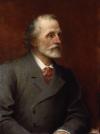[Iliad, B. XVII. V. 426]
So now the horses of Aiakides, off wide of the war-ground,
Wept, since first they were ware of their charioteer overthrown there,
Cast down low in the whirl of the dust under man-slaying Hector.
Sooth, meanwhile, then did Automedon, brave son of Diores,
Oft, on the one hand, urge them with flicks of the swift whip, and oft, too,
Coax entreatingly, hurriedly; whiles did he angrily threaten.
Vainly, for these would not to the ships, to the Hellespont spacious,
Backward turn, nor be whipped to the battle among the Achaians.
Nay, as a pillar remains immovable, fixed on the tombstone,
Haply, of some dead man or it may be a woman there-under;
Even like hard stood they there attached to the glorious war-car,
Earthward bowed with their heads; and of them so lamenting incessant
Ran the hot teardrops downward on to the earth from their eyelids,
Mourning their charioteer; all their lustrous manes dusty-clotted,
Right side and left of the yoke-ring tossed, to the breadth of the yoke-bow.
Now when the issue of Kronos beheld that sorrow, his head shook
Pitying them for their grief, these words then he spake in his bosom;
"Why, ye hapless, gave we to Peleus you, to a mortal
Master; ye that are ageless both, ye both of you deathless!
Was it that ye among men most wretched should come to have heart-grief?
'Tis most true, than the race of these men is there wretcheder nowhere
Aught over earth's range found that is gifted with breath and has movement."







